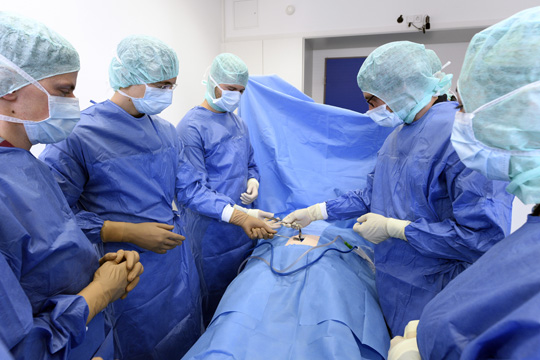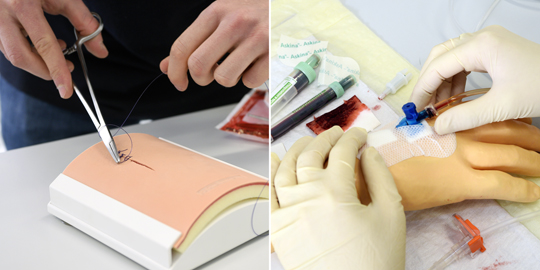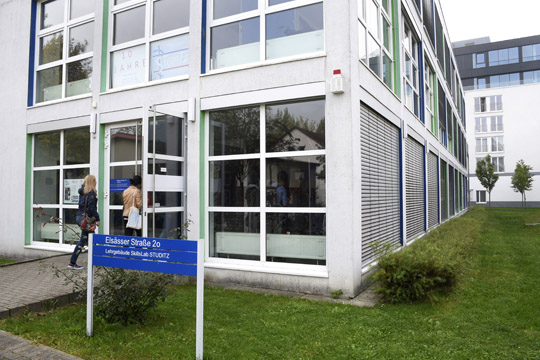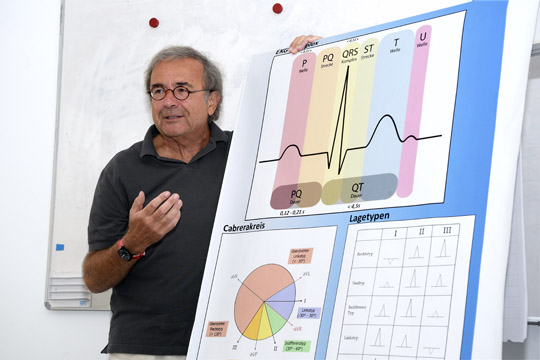Questions Welcome
Freiburg, Nov 14, 2018
Complete with mask, cap, apron and gloves, fastidiously observing every hygiene regulation, the students have gathered in the sterile zone around the operating table. As the heart monitor beeps regularly, tutor Dominik Stankewitz demands the first instrument in order to make the incision in the patient’s abdomen. Even if the patient is only a dummy, the situation is not just play-acted but treated like a serious case. There’s just one crucial difference: questions are always welcome. “Now I must ask you to pass the end of the tube to the anaesthetist in such a way that you don’t make yourself unsterile,” the tutor instructs the students who are assisting him. “So who’s the anaesthetist?” one of them asks, revealing that even questions that students wouldn’t normally dare to ask in routine studies, from fear of disgrace, are possible here.
 Operating on a dummy: students practise for their later professional life in the Faculty of Medicine Skills Lab.
Operating on a dummy: students practise for their later professional life in the Faculty of Medicine Skills Lab.
Photo: Thomas Kunz
By students for students
This is precisely the idea underlying the Skills Lab, which is available nationally in many medical faculties: student tutors teach other students skills that they will have to be able to use later in their professional lives. At the same time, there are fewer inhibitions about asking when things are unclear than in ordinary studies. University hospitals are usually hierarchically structured, and teaching using patients follows a strict choreography. At the same time – and not for the first time – the current Medical Studies Masterplan 2020 is designed to pursue the goal of training doctors in a more practical way. The solution: self-organized peer-to-peer learning, taught by students for students. The enthusiasm with which this idea has been received is evident, not least from the fact that the number of participants in Freiburg has increased almost five-fold since its beginnings – from 492 in the 2008/09 academic year to 2,231 in 2017/18.
It all started with a lot of student initiative – and tuition fees, which in this case immediately went to benefit those who paid them. The degree program commission approved funding of 150,000 euros to establish a Skills Lab for the Faculty of Medicine, in addition to 25,000 euros per year for running costs. Back in 2007 the then head of the Academic Dean’s Office, Dr. Irmgard Streitlein-Böhme, successfully took the necessary formal steps for application. “As far as I’m concerned, I can’t wait to get going,” enthused Sebastian Müller, one of the first assistants at the self-organized training center, full of optimistic energy in summer 2007. But before the starter’s gun could sound, there were still all the wearisome preparatory stages to get through, for example practical problems such as when the new apparatus arrived. “Unfortunately none of us here knew how to work with the new auscultation model properly. We had to get used to it ourselves first,” says tutor Christina Schwarting about the initial barriers, such as a purchase which students could use as a means to practise auscultation, or listening.
 Whether it’s suturing wounds (left) or giving infusions (right): the student training center supports the practical training of prospective doctors.
Whether it’s suturing wounds (left) or giving infusions (right): the student training center supports the practical training of prospective doctors.
Photos: Thomas Kunz
Enthusiastic tutors
Two other hurdles were crossed as well, once creatively, once with dogged determination. Creativity was needed to think up a name: should it be Lutz (Lern- und Trainingszentrum) or possibly TÄF (Trainingszentrum für Ärztliche Fertigkeiten)? In the end, the choice was StudiTZ (Studierenden-Trainingszentrum, or student training center). Rather more determination was needed to establish the post of a full-time coordinator, but everyone agrees that appointing Edith Zellmer was a stroke of luck. Over the years the classes on offer have been expanded and improved. In addition, the Alumni Freiburg e.V. association supported the training center’s procurement of medical apparatus. Now, the range of courses on offer stretches from auscultation and blood gas analysis through electrocardiography (ECG), pulmonary function diagnostics, suture skills, orthopaedia and reanimation, to ultrasound and venipuncture. Anyone who hears the enthusiasm with which Julian Heß, Tanja Hülsen and Valentin Hirsch talk about their work as tutors has the reassuring (from a patient’s point of view) feeling that a committed, technically adept and also socially competent generation of doctors is developing here.
The figures also show that the tutors know how to pass on their enthusiasm: anyone who has taken part generally tends to use StudiTZ in their subsequent studies. Doesn’t it ever get boring for tutors to keep practising the same things with their fellow students? “Absolutely not!” says Julian Heß. “The more often I do something, the more familiar it becomes and the more confidence I gain for my later professional real life.” And Valentin Hirsch highlights how much he has benefited from the guidance, being able to speak free of larger groups, while Tanja Hülsen already has new courses in mind that she wants to offer soon.
 The tutors regret that the training center isn’t better known – if it were up to them, even more students would find their way to Elsässer Straße 20 in future.
The tutors regret that the training center isn’t better known – if it were up to them, even more students would find their way to Elsässer Straße 20 in future.
Photo: Thomas Kunz
Initiative required
All this makes it even more astonishing to learn what all three of them regret: the StudiTZ courses are still not well-known amongst their fellow students. “Many people, both students and teachers, just don’t know that we’re there,” says Tanja Hülsen. How can that be? “We’re not established in the curriculum,” explains coordinator Edith Zellmer. So students don’t automatically learn about the possibilities of StudiTZ in the course of their studies. It calls for a certain amount of initiative, including in order to find suitable courses, and naturally they are already very busy with the – not exactly light – normal requirements of medical studies. “On the other hand, this frees us up to decide for ourselves what we want to offer and how,” explains Zellmer. “So the students can decide what they are missing in everyday studies, what would be a good addition to normal teaching, and develop their courses to suit. This is also our strength and we absolutely want to keep it.” The head of the Academic Dean’s Office, Prof. Dr. Petra Hahn, also believes the establishment of StudiTZ is a major step forward in improving teaching. “Experience with this positive learning environment will definitely play an important part in the planning of a forthcoming larger teaching building.”
 “There’s no more efficient method of learning than to teach others something,” says Helmut Wollschläger, who is deeply committed to the Freiburg Skills Lab.
“There’s no more efficient method of learning than to teach others something,” says Helmut Wollschläger, who is deeply committed to the Freiburg Skills Lab.
Photo: Thomas Kunz
Besides the students, another strength of StudiTZ is the many teachers who are equally committed to the idea and above all also ensure that the tutors are well-trained. One who is now deeply committed to spending part of his retirement there is Prof. Dr. Helmut Wollschläger, “StudiTZ is an incredible and very, very important institution. I’m sad that there was nothing like it when I was studying. There’s no more efficient method of learning than to teach others something.” However, Wollschläger is not just concerned about the content, but in particular about the attitude and motivation that leads anyone to become a doctor. “In my view, it is fundamentally important, as a doctor in a flat-rate fee-per-case system that is almost exclusively economically focused, to take a human approach to the patient and not just to see them as a customer or an economic factor. I try to convey this in every one of my courses. And I find that, across the board, the students here in StudiTZ have a pro-social attitude.” All the regular evaluations to date have so far indicated that StudiTZ is on the right path in this regard.
Jürgen Reuß

